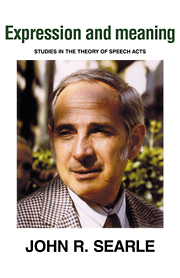5 - Literal meaning
Published online by Cambridge University Press: 05 June 2012
Summary
Most philosophers and linguists accept a certain conception of the notion of the literal meaning of words and sentences and the relation between literal meaning and other semantic notions such as ambiguity, metaphor, and truth. In this chapter I want to challenge one aspect of this received opinion, the view that for every sentence the literal meaning of the sentence can be construed as the meaning it has independently of any context whatever. I shall argue that in general the notion of the literal meaning of a sentence only has application relative to a set of contextual or background assumptions and finally I shall examine some of the implications of this alternative view. The view I shall be attacking is sometimes expressed by saying that the literal meaning of a sentence is the meaning that it has in the “zero context” or the “null context”. I shall argue that for a large class of sentences there is no such thing as the zero or null context for the interpretation of sentences, and that as far as our semantic competence is concerned we understand the meaning of such sentences only against a set of background assumptions about the contexts in which the sentence could be appropriately uttered.
I begin by stating what I take to be the received opinion as a set of propositions:
Sentences have literal meanings. The literal meaning of a sentence is entirely determined by the meanings of its component words (or morphemes) and the syntactical rules according to which these elements are combined. A sentence may have more than one literal meaning (ambiguity) or its literal meaning may be defective or uninterpretable (nonsense). […]
- Type
- Chapter
- Information
- Expression and MeaningStudies in the Theory of Speech Acts, pp. 117 - 136Publisher: Cambridge University PressPrint publication year: 1979
- 43
- Cited by

